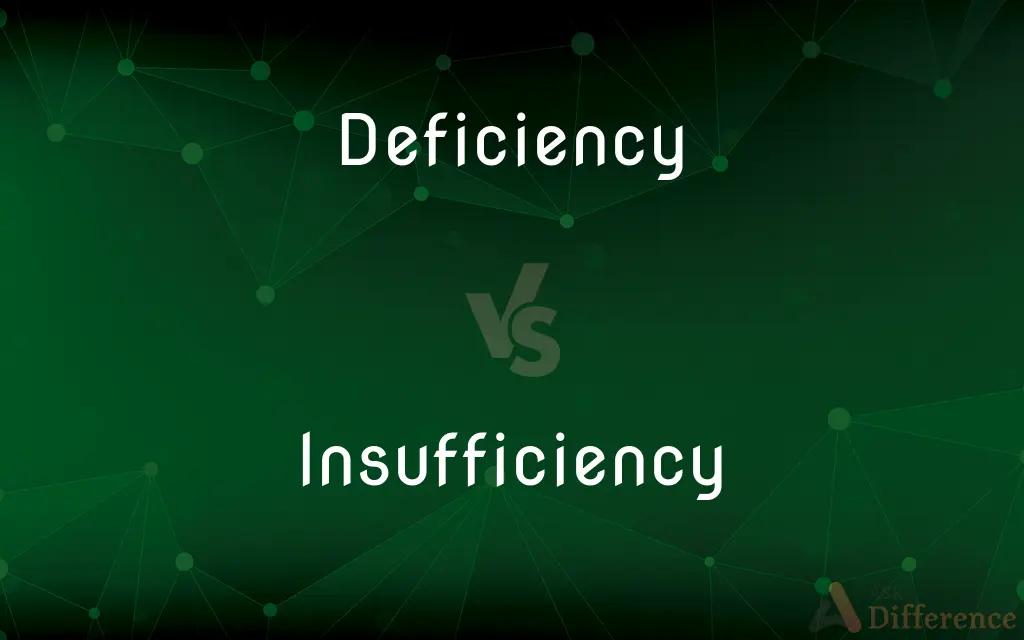Deficiency vs. Insufficiency — What's the Difference?
Edited by Tayyaba Rehman — By Urooj Arif — Updated on March 8, 2024
Deficiency implies a lack or shortage of something essential, often relating to health or nutrition, while insufficiency denotes inadequacy or not enough of something, usually more general and less severe.

Difference Between Deficiency and Insufficiency
Table of Contents
ADVERTISEMENT
Key Differences
Deficiency is commonly used in contexts where there is a complete or significant lack of something necessary, particularly in health and nutrition. For example, a vitamin deficiency means the body is lacking a specific vitamin crucial for normal functioning. Insufficiency, on the other hand, suggests that while there might be some quantity or level present, it is not adequate for normal function or needs, as in the case of sleep insufficiency, where a person might be getting some sleep but not enough to feel rested and function well.
In medical terms, deficiency often refers to a condition characterized by the absence or significantly reduced levels of a substance (like a hormone or enzyme) required for bodily functions. This can lead to specific diseases or health issues, such as iron deficiency leading to anemia. Insufficiency can also be medical but typically describes situations where the body or system has some capability or resource, but it's below optimal levels, potentially leading to less severe or widespread health impacts.
When discussing resources or capabilities, deficiency points to a glaring gap, where essential elements are missing, which can halt or severely impair functionality. In contrast, insufficiency indicates that while resources or capabilities may be present, they fall short of meeting the required standards or demands, possibly leading to inefficiencies or reduced performance.
In the context of performance or outcomes, a deficiency might suggest a fundamental flaw or lack that needs to be addressed for success, such as a skill deficiency in a professional setting. Insufficiency might imply that while the basic foundations are in place, they are not adequate to achieve the desired outcomes or reach full potential, hinting at a need for improvement rather than a complete overhaul.
Deficiency is often used in a more critical sense, implying that a vital component is missing, which can lead to serious consequences if not addressed. Insufficiency, while still indicating a problem, tends to suggest a situation that, although not ideal, might be manageable or correctable with less drastic measures, such as slight adjustments or enhancements.
ADVERTISEMENT
Comparison Chart
Implication
Lack or shortage of something essential
Inadequacy or not enough of something
Severity
Often more severe, indicating a significant gap
Generally less severe, suggests a shortfall
Contexts
Common in health, nutrition, and essential needs
Broader, can apply to resources, capabilities, performance
Consequences
Can lead to specific diseases or functional impairments
May result in reduced efficiency or performance
Solution
May require significant intervention to address
Often manageable with improvements or adjustments
Compare with Definitions
Deficiency
The state of lacking something that is necessary.
Vitamin D deficiency can lead to bone problems.
Insufficiency
The condition of being insufficient or not enough.
Sleep insufficiency can have serious health consequences.
Deficiency
Inadequacy or shortage in the quantity or quality of something essential.
The project failed due to a deficiency in planning.
Insufficiency
The state of being not adequate for a specified purpose.
The budget's insufficiency halted the project's progress.
Deficiency
A failing or shortcoming in a person's character or knowledge.
His lack of empathy was seen as a moral deficiency.
Insufficiency
A lack of competence or ability in a specific area.
His insufficiency in leadership skills was evident.
Deficiency
The amount by which something, especially a sum of money, is too small.
The account showed a deficiency of several thousand dollars.
Insufficiency
Inadequacy in power, capacity, or quality to meet a need.
The insufficiency of the evidence led to the case's dismissal.
Deficiency
A lack or shortage of a functional element within an organism, leading to health issues.
Iron deficiency is a common nutritional problem worldwide.
Insufficiency
Not having or providing enough of what is needed.
Water insufficiency in the region led to agricultural challenges.
Deficiency
The quality or condition of being deficient; incompleteness or inadequacy.
Insufficiency
Inadequate supply
An insufficiency of funds.
Deficiency
A lack or shortage, especially of something essential to health
A nutritional deficiency.
Insufficiency
Inability of a bodily part or organ to function normally
Cardiac insufficiency.
Deficiency
(uncountable) Inadequacy or incompleteness.
Insufficiency
Moral or mental incompetence.
Deficiency
(countable) An insufficiency, especially of something essential to health.
Insufficiency
A failing; an inadequacy
Pointed out the insufficiencies in my report.
Deficiency
(geometry) The amount by which the number of double points on a curve is short of the maximum for curves of the same degree.
Insufficiency
The lack of sufficiency; a shortage or inadequacy.
The troops went hungry because of the insufficiency of their supplies.
Deficiency
(geometry) The codimension of a linear system in the corresponding complete linear system.
Insufficiency
The quality or state of being insufficient; lack of sufficiency; deficiency; inadequateness; as, the insufficiency of provisions, of an excuse, etc.
The insufficiency of the light of nature is, by the light of Scripture, . . . fully supplied.
Deficiency
The state of being deficient; inadequacy; want; failure; imperfection; shortcoming; defect.
[Marlborough] was so miserably ignorant, that his deficiencies made him the ridicule of his contemporaries.
Insufficiency
Lack of power or skill; inability; incapacity; incompetency; as, the insufficiency of a man for an office.
Deficiency
The state of needing something that is absent or unavailable;
There is a serious lack of insight into the problem
Water is the critical deficiency in desert regions
For want of a nail the shoe was lost
Insufficiency
A lack of competence;
Pointed out the insufficiencies in my report
Juvenile offenses often reflect an inadequacy in the parents
Deficiency
Lack of an adequate quantity or number;
The inadequacy of unemployment benefits
Insufficiency
(pathology) inability of a bodily part or organ to function normally
Insufficiency
Lack of an adequate quantity or number;
The inadequacy of unemployment benefits
Common Curiosities
Can something be both deficient and insufficient at the same time?
Yes, an element can be both deficient (severely lacking) and insufficient (not enough for requirements) in different contexts or degrees.
Can insufficiency lead to deficiency if not addressed?
Yes, if insufficiency in a critical area is not addressed, it can deteriorate into a deficiency, leading to more severe consequences.
How do medical professionals distinguish between deficiency and insufficiency?
Medical professionals use diagnostic criteria, including laboratory tests and clinical symptoms, to determine the level of severity and categorize conditions as either deficiency or insufficiency.
Is insufficiency always a less severe condition than deficiency?
Typically, insufficiency is less severe than deficiency, but its impact can still be significant depending on the context and what is insufficient.
Can a deficiency be corrected to become merely an insufficiency?
Yes, addressing a deficiency might improve the condition to a level of insufficiency before fully meeting the required standard or need.
Can societal or economic issues be categorized as deficiency or insufficiency?
Yes, societal and economic issues can be framed in terms of deficiency (lack of essential services or resources) or insufficiency (inadequate provision of needs).
Can financial budgets be deficient or just insufficient?
Financial budgets can be deficient if critical components are missing and insufficient if they do not allocate enough resources to meet all planned activities or needs.
In healthcare, how is medication dosage determined for deficiency vs. insufficiency?
Dosage for deficiencies might be higher or more aggressive to replenish the missing elements, while insufficiency might require a more moderate approach to supplement the shortfall.
How do deficiencies and insufficiencies affect performance in a professional setting?
In a professional setting, deficiencies might indicate critical skill gaps affecting job performance, while insufficiencies could point to areas needing development for optimal performance.
Can a diet be both deficient and insufficient in nutrients?
A diet can be deficient in specific essential nutrients while also being insufficient in providing the overall nutritional needs for good health.
Is it easier to correct insufficiency than deficiency?
Generally, correcting insufficiency might require less intensive interventions compared to addressing a deficiency, which might need more comprehensive measures.
In education, how are learning deficiencies different from learning insufficiencies?
Learning deficiencies might refer to significant gaps in foundational knowledge or skills, while learning insufficiencies could involve areas where improvement is needed for better understanding or performance.
How do deficiencies and insufficiencies impact environmental sustainability?
In environmental contexts, deficiencies (like lack of biodiversity) and insufficiencies (such as inadequate waste management) can both have detrimental effects on sustainability efforts.
How do deficiency and insufficiency relate to mental health?
In mental health, deficiencies might refer to significant neurotransmitter imbalances, while insufficiencies could involve less severe psychological needs not being met.
Share Your Discovery

Previous Comparison
Then vs. Now
Next Comparison
Etsy vs. FiverrAuthor Spotlight
Written by
Urooj ArifUrooj is a skilled content writer at Ask Difference, known for her exceptional ability to simplify complex topics into engaging and informative content. With a passion for research and a flair for clear, concise writing, she consistently delivers articles that resonate with our diverse audience.
Edited by
Tayyaba RehmanTayyaba Rehman is a distinguished writer, currently serving as a primary contributor to askdifference.com. As a researcher in semantics and etymology, Tayyaba's passion for the complexity of languages and their distinctions has found a perfect home on the platform. Tayyaba delves into the intricacies of language, distinguishing between commonly confused words and phrases, thereby providing clarity for readers worldwide.














































